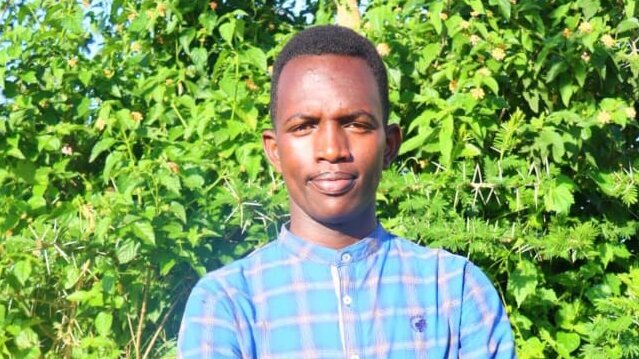Brian Chirchir: A medical student on a mission to educate masses on cancer

Mr Brian Chirchir who has the passion of drafting his life stories to document events and challenges to inspire generations. He is using his passion for writing to sensitise the public on cancer related topics. Photo/Jeremiah Choge
While in high school, Brian Chirchir realised that he had a passion in drafting his life stories to document events and challenges to inspire generations.
He started with manuscripts of fictional stories that carry moral teaching and motivational values.
But this did not last long until when he encountered a cancer patient who changed his aspirations and destined for the medical field where he discovered that people in the society were dying of ignorance or limited information.
“It was really devastating to see how a cancer patient endured pain. He was one of my relatives and he was all through palliative care, and the treatment process financially drained out the family for close to three years and he eventually passed away,” he told Avdelta News in an interview.
Mr Chirchir,19, noted that no one knew what an over 60 years old man was suffering from until when he was diagnosed with stage three stomach cancer. It had taken a toll on his health and the condition was medically complicated to manage.
He also said that five other members of his extended family have succumbed to cancer related illnesses since his childhood.
Since then, after completing form four in Aldai Boys’ Secondary School where he garnered a B plain in his KCSE, he was lucky enough to be among students selected to take medical related courses at Kabarak University School of Medicine.
His core ambition from the onset was to empower people in the society with knowledge and the tragic death of his relative in 2019 influenced him and he couldn’t wait any longer.
Just as a first year student in Clinical Medicine and Surgery, Chirchir started his journey to study on his own about the types of cancers among other tumors developed in human bodies.
And in his second year he published his first book dubbed Cancer Chronicles, a 150 pages book illustrating variations of cancerous diseases and their manifestation in human anatomy.
“Actually the book is not for medical students or researchers. I deliberately wrote the book to sensitize ordinary members of the public in simplified English and Swahili language,” he explained.
Chirchir cited inadequate learning materials as a great setback in awareness initiatives the Kenyan government has made for years.
“If cancer had been detected at initial stages, mzee (the elderly male relative) would have survived and perhaps the cancerous cells would be successfully treated. The symptoms were neglected or misdiagnosed which exacerbated his health condition,”he recalls.
He reminisced that during his primary and secondary school education, the HIV and Aids was part of the disciplines in the curriculum for close to 30 years after the first patient tested HIV positive in 1984 in Kenya.
The efforts put in place by the government in the fight against the viral epidemic have so far paid off as a result of accessible information and medical services.
“But cancer has been overlooked despite the increasing deaths and prevalence on a daily basis. There is an urgent need to constitute cancer awareness training in our institutions for general human health and care," urged Chirchir.
He has started developing proposals to push the Ministry of Health to introduce Cancer awareness reading materials in school libraries in Kenya.
In 2020, the United Nations Population Fund (UNPF) revealed that cancer is a third cause of death in Kenya placing a burden on families, communities and health system.
It’s also stated that new arising cases are staggering at 40, 000 and 27, 000 cancer related deaths which are estimated to steadily increase by seven percent annually.
According to the county health report, the prevalence of prostate cancer Nandi County is at over 200 cases but those close to medical management is ranging between 80-100 patients.
The vagaries of cancer are dire and Chirchir claimed that the members of the community are speaking about in hushed tones and thus victims have been neglected.
“Stigma is a cancerous disease that has derailed the fight against the monster. People fear to speak about their status or undergo cancer screening for early detection and you find in most cases the treatment starts in stage three or four when condition cannot be reversed,” he told Avdelta News.
In his book, Chirchir, who is looking forward to further pursuing clinical oncology after attaining his first degree in clinical medicine, said cancer can be cured if the people would be bold enough to seek treatment and stick to the prescribed diet.
Out of 124 types of cancerous cells, he narrowed down to five classical types of cancers including Carcinomas, Sarcomas, Leukemias, Lymphomas and Central Nervous System cancers with their symptoms and causes.
“It’s too early to say that I can start fighting cancer in society, but I can use my talent to write books for young learners. Cancer is a lifestyle disease and the children at the age of 10 years should have understood its preventive measures and adopt for healthy living,” explains Chirchir.
He has also authored the Devoid of Mercy book and has more books to solace and motivate the neglected cancer victims in the society.
He termed Kenya's discrimination and exploitative, noting that ordinary citizens cannot access screening centers and medical services.
“NHIF or Shiv cannot cover the medical treatment of the patients seeking specialized cancer treatment locally and abroad. It’s my concern that the government should consider putting more funds in research and medical innovation in cancer treatment to leverage cancer menace in the country," said a soft-spoken Chirchir.
